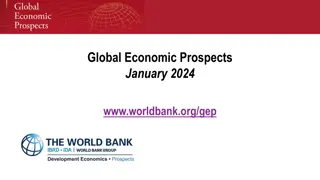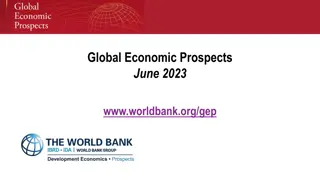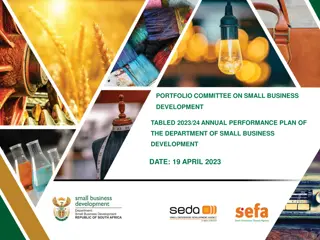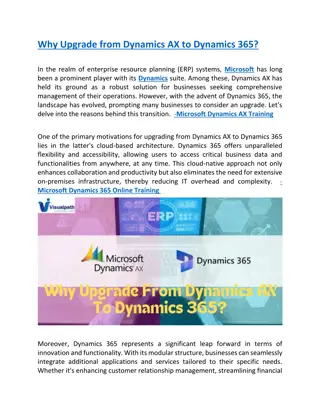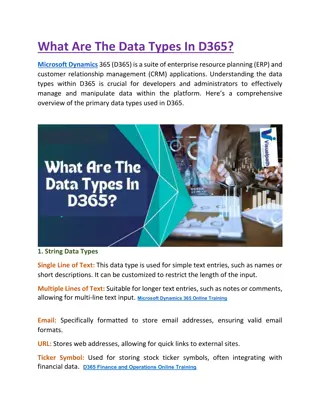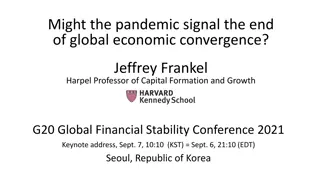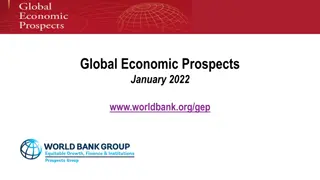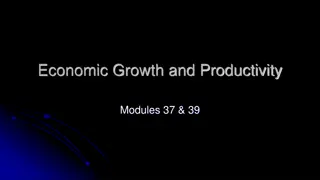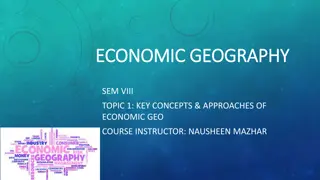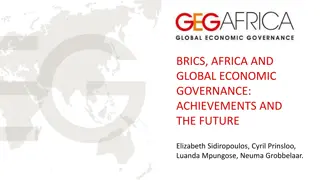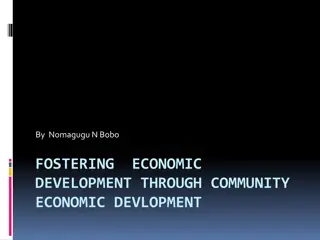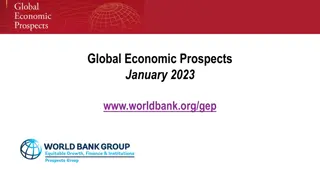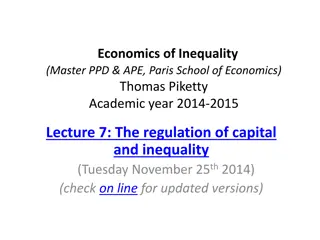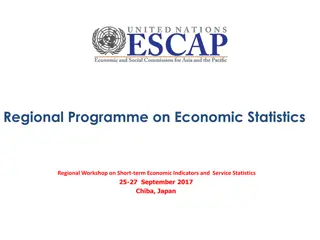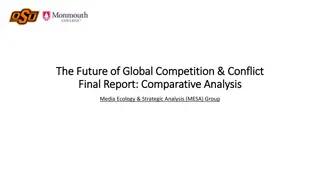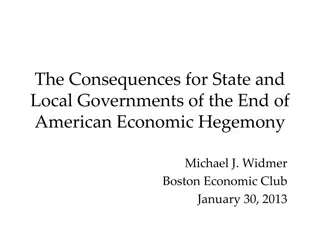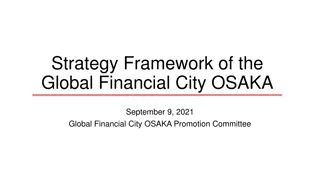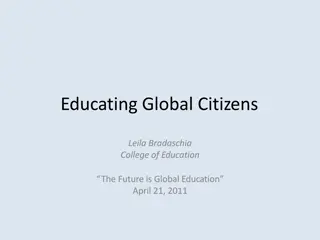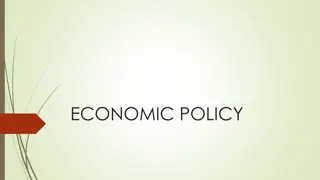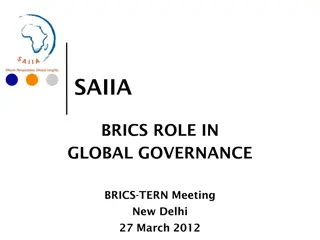Global Economic Dynamics
Local economic developments reflect global forces in this era of globalization. Understanding the intersection of politics and economics in the global economy is essential. Governments, international institutions, and the winners and losers of global exchange shape the dynamics of International Political Economy (IPE).
Uploaded on Mar 12, 2025 | 1 Views
Download Presentation

Please find below an Image/Link to download the presentation.
The content on the website is provided AS IS for your information and personal use only. It may not be sold, licensed, or shared on other websites without obtaining consent from the author.If you encounter any issues during the download, it is possible that the publisher has removed the file from their server.
You are allowed to download the files provided on this website for personal or commercial use, subject to the condition that they are used lawfully. All files are the property of their respective owners.
The content on the website is provided AS IS for your information and personal use only. It may not be sold, licensed, or shared on other websites without obtaining consent from the author.
E N D
Presentation Transcript
TIU Tishk International University Faculty of Admin. Sciences & Economics Dept. IRD International International Political Economy Political Economy Code: IRD 306 HE Educator Dr Neville D Cunha Professor of IRD
Introduction to International Political Economy (IPE) I Local economic developments reflect global forces. In this era of globalization, the factors that shape our economic lives are as likely to originate in far away places as they are to stem from local events. Understanding the global economy requires knowledge of politics as well as economics. For globalization is not a spontaneous economic process; it is built on a political foundation. Studying the political and economic dimensions of the global economy requires us to develop theory that simplifies an inherently complex world.
Dynamics of IPE Governments share a broad consensus on core principles; core principles inform the elaboration of specific rules. Specific rules establish international institutions --- the World Trade Organization (WTO), the World Bank, and the International Monetary Fund (IMF). These international institutions in turn facilitate a political process through which governments reduce barriers to global exchange and create common rule to regulate other elements of the global economy. This political system --- the foundation and the process --- has enabled businesses to construct the network of international economic linkages that constitute the economic dimension of globalization.
Theoretical Framework Part I This course is based on a theoretical framework in which politics in the global economy revolve around enduring competition between the winners and the losers generated by global economic exchange. Political economists speculate that global exchange raises aggregate social welfare. Yet, global exchange also creates winners and losers. For some, global exchange brings greater wealth and rising incomes; for others, however, the international economy brings job losses and lower incomes. These winners and losers compete to influence government policy.
Theoretical Framework Part II Those who profit from global exchange encourage governments to adopt policies that facilitate such exchange; those harmed by globalization encourage governments to adopt policies that restrict it. This competition is played out through domestic politics, where it is mediated by domestic political institutions, and it is played out through international politics, often within the major international institutions such as the G20 and the WTO.
Living in a Global Economy - 1 We live in a global economy. Living in a global economy also means that global economic forces play a large role in determining many of our career opportunities. Thus, the opportunities available to a typical modern citizen are far different today than they were only 35 years ago. The global economy has played a central role in bringing about these changes, shaped by global, rather than national (much less local) economic forces.
Living in a Global Economy - 2 IPE studies how politics shape developments in the global economy and how the global economy shapes politics. Although all societies benefit from participation in the global economy, these gains are not distributed evenly among individuals. The distributive consequences of global economic exchange generate political competition in national and international arenas.
IPE: Winners and Losers I The winners seek deeper links with the global economy in order to extend and consolidate their gains, whereas the losers try to erect barriers between the global and national economies in order to minimize or even reverse their losses. International political economy studies how the enduring political battle between the winners and losers from global economic exchange shapes the evolution of the global economy.
IPE: Winners and Losers II The winners seek deeper links with the global economy in order to extend and consolidate their gains, whereas the losers try to erect barriers between the global and national economies in order to minimize or even reverse their losses. International political economy studies how the enduring political battle between the winners and losers from global economic exchange shapes the evolution of the global economy.
IPE: Field of Study This course introduces IPE as a field of study. It begins by providing a broad overview of the issues that IPE examines and the kinds of questions scholars ask when studying these issues. IPE studies the political battle between the winners and losers of global economic exchange. It examines how this political competition shapes the evolution of the international trade and monetary systems, affects the ability of MNCs to conduct their operations, and influences the development strategies governments adopt. Thus, IPE suggests that it is hard to understand anything about the global economy without understanding how political competition unfolds.
IPE: Our Approach This course relies on an approach that emphasizes the interaction between societal interests and political institutions. Such an approach will enable us to develop models that provide insights into: 1. how the global economy generates winners and losers. 2. how these groups compete to influence the policies that governments adopt, and 3. how the policies that governments adopt affect the evolution of global economy.
TIU Tishk International University Faculty of Administrative Sciences and Economics Dept. IRD International Political Economy International Political Economy Code: IRD 306 LECTURE 2: INTRODUCTION TO IPE HE Educator Dr Neville D Cunha Professor of IRD
IPE: Introduction (Lecture 2) Interests and Institutions in International Political Economy To explain the policy choices made by governments: 1. First, we need to understand where the interests, or economic policy preferences, of groups in society come from. 2. Second, we need to examine how political institutions aggregate, reconcile, and ultimately transform competing interests into foreign economic policies and a particular international economic system.
IPE: Introduction (Lecture 2) Interests 1. Interests are the goals or policy objectives that the central actors in the political system and in the economy--- individuals, firms, labor unions, other interest groups, and governments---want to use foreign economic policy to achieve. 2. In focusing on interests, we will assume that individuals/groups prefer foreign economic policies that raise their incomes to policies that reduce their incomes.
IPE: Introduction (Lecture 2) Interests: 2 Mechanisms to explain the formation of these policy interests 1. Material Interests: Arise from people position in the global economy. What you do for work influence your foreign policy preferences. One s position in the economy powerfully shapes one s preferences regarding foreign economic policy. Economic theory enables us to make some powerful statements about the foreign economic policy preferences of different groups in the economy.
IPE: Introduction (Lecture 2) Interests: 2 Mechanisms to explain the formation of these policy interests 2. Ideas: Interests are often based on ideas. Ideas are mental models that provide a coherent set of beliefs about cause-and-effect relationships. In the context of economic policy, these mental models typically focus on the relationship between government policies and economic outcomes. What matters, therefore, is not whether a particular idea is true or not, but whether people in power, or people with influence over people with power, believe the idea to be true. Thus, ideas about how the economy operates can be a source of the preferences that groups have for particular economic policies.
IPE: Introduction (Lecture 2) Political Institutions: To understand how these competing interests are transformed into foreign policies, we need to examine political institutions. 1. Political Institutions establish the rules governing the political process. By establishing rules, they enable groups within countries, and group of countries in the international state system, to reach and enforce collective decisions. 2. Political Institutions determine which groups are empowered to make choices and establish the rule these choosers will use when doing so.
IPE: Introduction (Lecture 2) Political Institutions: Domestic Political Systems 1. Democratic Institutions promote mass participation in collective choices. 2. Authoritarian systems restrict participation to a narrow set of individuals International Economic Affairs 3. Governments from the advanced industrialized countries often make decisions with little participation by developing countries.
IPE: Introduction (Lecture 2) Political Institutions: 1. Political institutions also provide the rules that these groups use to make decisions. A.In democratic systems, the usual choice rule is majority rule, and policies are supposed to reflect the preferences of a majority of voters and legislators. B. In International economic organizations, the choice rule is often relative bargaining power, and decisions typically reflect the preferences of the more powerful nations. Political institutions thus allow groups to make these decisions and in doing so, determine who gets to make these decisions and how they are made.
IPE: Introduction (Lecture 2) Political Institutions: Enforcement of Collective Decisions Domestic Political Systems A. In domestic political systems, the police and the judicial system are charged with enforcing individual compliance with collective decisions. International Economic Systems B. International institutions like the WTO and the IMF can help governments enforce the international agreements that they conclude.
IPE: Introduction (Lecture 2) Conclusion Focus on Interests and Institutions A. It enable us to develop a set of reasonably comprehensive understanding of how politics shape societal decisions about allocation of resources. B. Investigating the source of competing societal demands for income and then exploring how political institutions ultimately transform these competing demands into foreign economic policies and a particular international economic system does provide a solid point to further study IPE.
TIU Tishk International University Faculty of Admin. Sciences & Economics Dept. IRD International International Political Economy Political Economy Code: IRD 306 HE Educator Dr Neville D Cunha Professor of IRD
Lecture III What is IPE? 1. IPE studies the political battle between the winners and losers of global economic exchange. 2. Understanding developments in the global economy requires us to draw on economic theory, explore domestic politics, examines the dynamics of political interactions between governments, and familiarize ourselves with international economic organizations.
Lecture III What is IPE? One way scholars simplify the study of the global economy is to divide the substantive aspects of global economic activity into distinct issue areas. Typically, the global economy is broken into four such issue areas: 1. The International Trade System 2. The International Monetary System 3. Multinational Corporations (MNCs) 4. Economic Development
Lecture III What is IPE? 1. Rather than studying the global economy as a whole, scholars will focus on one issue area in relative isolation from others. Of course, it is somewhat misleading to study each issue area independently: MNCs, for example, are important actors in the international trade system. The international monetary system exists solely to enable people living in different countries to engage in economic transactions with each other. It has no purpose, therefore, outside considerations of international trade and investment, 4. Moreover, problems arising in the international monetary system are intrinsically connected to developments in international trade and investment, 5. Trade, MNCs, and the international monetary system in turn play important roles in economic development. 2. 3.
Lecture III What is IPE? In spite of these deep connections, the central characteristics of each area are sufficiently distinctive that one can study each in relative isolation from the others, as long as one remains sensitive to the connections among them when necessary. Those who study the global economy through the lens of IPE are typically interested in doing more than simply describing government policies and contemporary developments in these four areas. Most scholars aspire to make more general statements about how politics shape the policies that governments adopt in each of these issue areas. Moreover, most scholars want to draw more general conclusions about the consequences of these policies.
Lecture III Questions shaping IPE scholarship First, how exactly does politics shape the decisions that societies make about how to use the resources that are available to them? Second, what are the consequences of these decisions? Thus, the study of IPE is in many respects the study of how the political battle between the winners and losers of global economic exchange shapes the decisions that societies make about how to allocate the resources they have available to them.
Lecture III Questions shaping IPE scholarship All resources are finite. As a result, choices about how to allocate resources will always be made against a backdrop of scarcity. Any choice in favor of one use therefore necessarily implies a choice to forgo another possible use. Societies consequently will always confront competing demands for finite resources. One of the importance goals of IPE as a field of study is to investigate how such competing demands are aggregated, reconciled, and transformed into foreign economic policies.
Lecture III Questions shaping IPE scholarship 1. The second question asks what are the consequences of the choices that societies make about resource allocation? These decisions have two very different consequences. 2. Decisions about resource allocation have welfare consequences --- that is, they determine the level of societal well-being. 3. Some choices will maximize social welfare --- that is, they will make society as a whole as well-off possible given existing resources. 4. Other choices will cause social welfare to fall below its potential, in which case different choices about how to use resources would make society better off. 5. Decisions about the resource allocation also have distributional consequences --- that is, they influence how income is distributed between groups within countries and between nations in the international system.
Lecture III Studies shaping IPE scholarship These two abstract questions give rise to two very different research traditions within IPE. One tradition focuses on explanation, and the second focuses on evaluation. Explanatory studies, which relate most closely to our first abstract question, are oriented toward explaining the foreign economic policy choices that governments make, Such studies most often attempt to answer why questions.
Lecture III Studies shaping IPE scholarship For Example: 1. Why does one government choose to lower tariffs and open its economy to trade, whereas another government continues to protect the domestic market from imports? 2. Why did governments create the WTO? 3. Why do some governments allow MNCs to operate in their economies with few restrictions, whereas other governments attempt to regulate MNC activity? Each of these questions asks us to explain a pattern of choices within a group of governments. In answering such questions, we are most concerned with explaining the policy choices that governments make and pay less attention to the welfare consequences of these policy choices.
Lecture III Studies shaping IPE scholarship Evaluative studies, which are related closely to our second abstract question, are oriented toward assessing policy outcomes, making judgments about them, and proposing alternatives when the judgment made about a particular policy is a negative one. A welfare evaluation is interested primarily in whether a particular policy choice raises or lowers social welfare, In some instances, scholars evaluate outcomes in terms of their distributional consequences.
Lecture III Studies shaping IPE scholarship For Example: 1. Does a decision to liberalize trade raise or lower national economic welfare? 2. Does a decision to turn to the International Monetary Fund (IMF) and accept a package of economic reforms promote or retard economic growth? Because such evaluations are concerned with the economic welfare consequences of policy outcomes, they are typically based on economic criteria and rely heavily upon economic theories.
Lecture III Studies shaping IPE scholarship Scholars also sometimes evaluate outcomes in terms that extend beyond narrow considerations of economic welfare. In some instances, scholars evaluate outcomes in terms of their distributional consequences. For Example: 1. Many nongovernmental organizations are highly critical of international trade because they believe that workers lose and business gains from trade liberalization. Implicit in this criticism is an evaluation of how global trade distributes income across groups within countries.
Lecture III Studies shaping IPE scholarship Evaluations may also extend the frame of reference within which outcomes are evaluated beyond purely economic efficiency. For e.g., even those who agree that international trade raises world economic welfare might remain critical of globalization because they believe that it degrades the environment, disrupts traditional methods of production, or has other negative social consequences that outweigh the economic gains. Evaluation and Explanation both play an important role in international political economy.
Topic I Concluded Thank you!!! Next Topic IPE: Historical Perspectives


